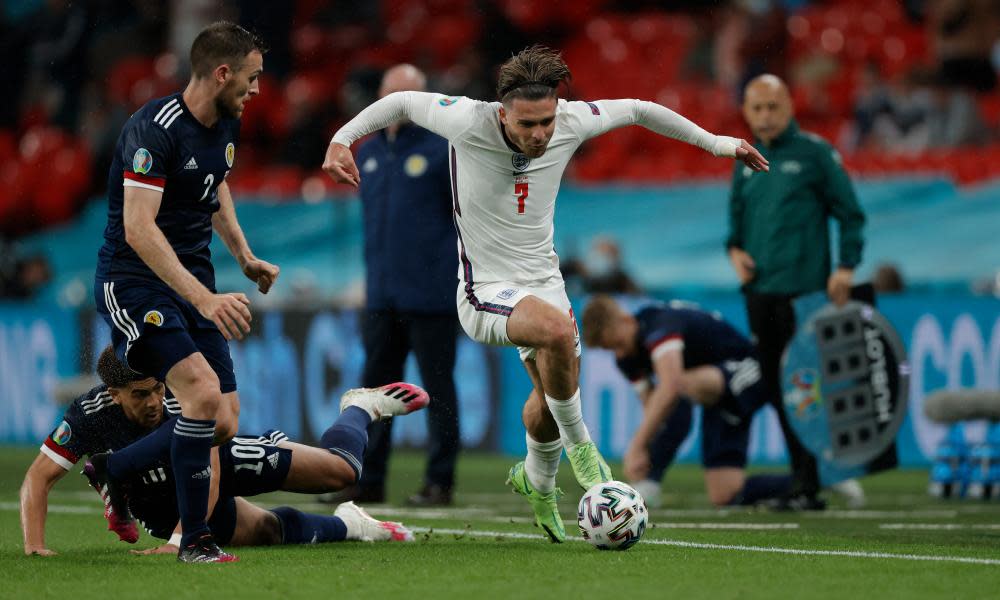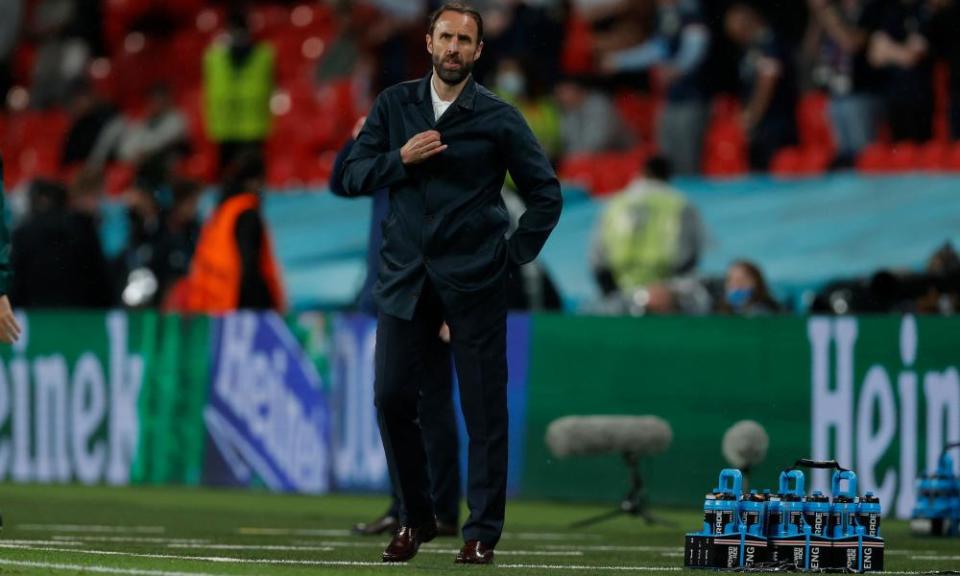Don’t panic! England must resist temptation to change too much

Oh dear. This wasn’t how it looked in the brochures. If you believe everything you read England’s progress through Euro 2020 Group D has now become a kind of social media meme made flesh.
How it started: 37 goals in qualifying, Gareth stroking his beard in the shadow of the Goljak mountains, pondering his weapons of fluently interchangeable attacking destruction.
Related: Harry Kane left looking out of place as system built around him fails to click | Jonathan Liew
And how it’s going? Well, let’s see. Two games. Three shots on target. One goal scored. Four points gathered – but four muted, minor-chord points, points that feel bad.
Add to this a team captain who seems to be here in a kind of strict observer’s role, peering on through his opera glasses and making the odd note while a football match takes place within the safely proscribed distance. Chuck in a series of doomed popular causes with which to beat the manager: the sacrifice of Saint Jack, the wronging of Jude, the exile of Bukayo, not to mention the complete disappearance of the mercurial Jadon Sancho, who has played an hour of football for England this year.
Blink a little, however, and all is not lost. There were two causes for optimism at Wembley. First, the players weren’t booed at that start. They were booed at half-time. They were booed at the end. But the start, well, that was fine. We’ll always have the start.
And secondly, it’s all out there now. There will be backlash and tears, proportionate to the swing the other way into fevered over-optimism. But England are still essentially the same quite good team they were before a muddled 0-0 draw against awkward opponents.
A more positive spin is that the mild drift around the England team, the sense of ideas becoming muddled, is now flushed into the light. This has its benefits.
Southgate must now feel the lash of public disappointment because we demand a guy, a dupe, a boob, a whipping boy to be pitchforked on to the pyre. But a little reality is also useful. England are good, but they are hardly a tournament juggernaut. Chuck in the subs and England used six players against Scotland who weren’t involved in Europe’s premier club competition last season.
The market doesn’t lie. These are fine, often highly promising players. But this team isn’t good enough to busk it or rely on individual inspiration. The structures and the patterns need to be right.

So here, as they say in Australian sports writing, is the thing. England are not in a bad spot. But they will be in a worse spot if they panic or try to change too much. There may be a clamour to instil a different tone and tempo in the team, but that time has now passed.
For example, an alternative version of this England appeared in the 4-0 defeat of Iceland last year when Southgate played Mason Mount in the two-man pivot and a lucid front four with both Jack Grealish and Phil Foden.
That was a dead game, and Southgate has never again deployed quite so many attacking gears. We are instead here, in this timeline, with this set of methods and plans. England are, as a wise man once said, still fighting for this. And there are causes for optimism.
Most obviously, the defence is good. For all the gloom England have conceded one goal in their past eight games. Only Belgium and Poland have scored against them from open play since September 2019. Jordan Pickford is in good form (with his hands). Southgate is a defence-facing coach. This part, the bit he obviously enjoys and fascinates over, has been sound.
The issue comes in what most people have assumed to be this team’s strong point, an attack that has delivered three goals in its past four games. It is unsurprising this has proved the hardest part of the job. Coaching an attacking system is a very difficult, specialised task in modern football, where space is so tight.
This is what coaches like Pep Guardiola work relentlessly at. And while it would be incorrect to suggest England have no attacking plan – the front three at these Euros is the same as in England’s last two qualifiers in March – there is a vagueness here, a lack of pattern, a sense of missing detail.
What exactly is Harry Kane’s role now? Is he playing as a genuine nine and cutting edge (not from where I’m sitting)? Or as he does in club football? There is no clarity. Kane himself looks puzzled.
Foden looks a little rudderless pushed so wide on the right, isolated by defenders into wheeling around on his (much) weaker foot. There was a suggestion at one point Foden was cleverly staying wide in order to free space for Kalvin Phillips to maraud in behind. If this is the plan then it is a strange one. Foden is the brightest technical player England have produced in a long while. To have him haring off out of the way, a decoy runner for a player with one goal and two assists last season, would be an act of creative self-sabotage.
England do not have a Kevin De Bruyne. But they have missed Jordan Henderson, a different kind of presence
Grealish has been given 27 minutes in a team that had lost its way. Sancho has been quietly disappeared, like an out-of-favour governor airbrushed from the great dictator’s holiday snaps.
All of these players look ill-used or underdone right now. Meanwhile England’s attacking plan seems to revolve around Having Good Attacking Players, sending them out in a combination of one to run, one to pass, one to finish, and hoping it works.
There are two ways out of this mild slough for Southgate. The most progressive would be to intervene in the part of the pitch that speaks to both of these sections. The use of two essentially defensive central midfielders, plus Mount in a deeper role, became a clog against Scotland.
France and Belgium are the standard to follow, but they have genuine high-end passing midfielders to manage that part of the pitch. England do not have a Kevin De Bruyne. But they have missed Jordan Henderson, a different kind of presence.
The better option is not to panic. The worst thing Southgate can do is to reconfigure his team mid-tournament, to throw off his defensive weeds and attempt, awkwardly, to dance. Grealish should replace Foden simply on form.
Kane needs to understand his role better, and receive some kind of service from the rest of the team. A little on-field leadership from a nice, mannered group of players may help too.
The temptation will remain to see alternative worlds, the fever dream of cavalier Gareth-led attack. But this is the current version of England. And for all the pallor and doom of Wembley on Friday night, it is worth remembering it doesn’t always take much.

 Yahoo Movies
Yahoo Movies 
